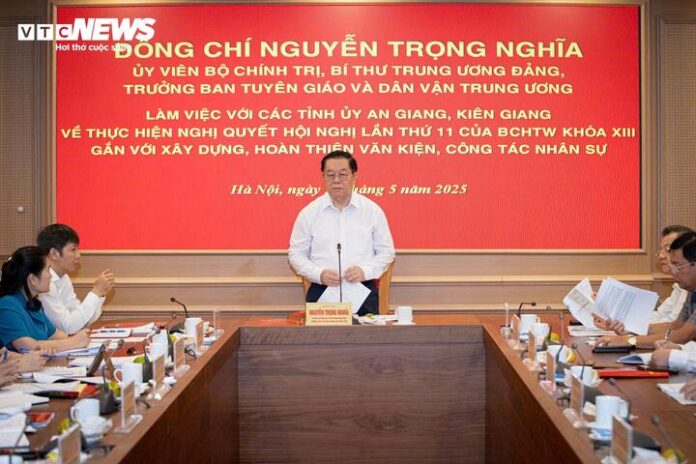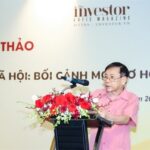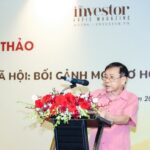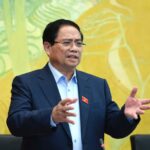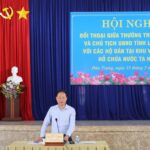Deputy Head of the Central Committee for Propaganda and Public Relations, Nguyen Trong Nghia, emphasized the following key tasks for the provinces of An Giang and Kien Giang during a working session with the provincial party committees on May 28th:
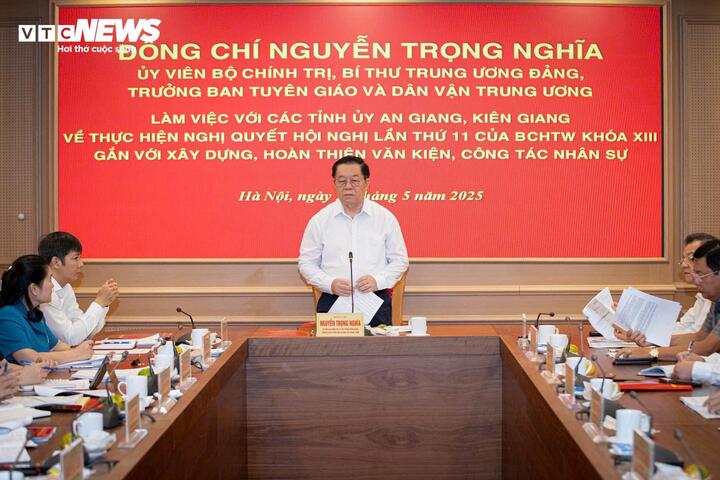
Deputy Head of the Central Committee for Propaganda and Public Relations, Nguyen Trong Nghia, giving directives at the working session.
He emphasized the need to continue doing a good job in terms of propagation, advocacy, and orientation of thought and public opinion, ensuring unity, consensus, and high agreement among officials, party members, civil servants, public employees, workers, and all strata of the people.
Referring to General Secretary To Lam’s instruction to accept the sacrifice of personal interests for the common good, the nation, and the people, Nghia noted that rearranging should not create a sense of neglect or make officials feel “abandoned.” He further added that it is crucial to continue evaluating, reviewing, and assigning tasks appropriately to maximize the capabilities, dedication, and qualifications of officials within the overall apparatus.
“At the same time, we should have a plan for further expansion. We now have Resolution No. 68 on the development of the private sector, and we are perfecting the mechanisms and regulations to allow party members to engage in private economic activities. In the future, when they finish their tasks in the public sector, they can return to their localities and families and transition to other fields. As party members, they should continue to contribute in different areas, and there are very favorable mechanisms and regulations in place for this,” Nghia said.
He emphasized the possibility of combining public and private sectors, allowing officials to utilize their experience from the public sector to contribute to socio-economic development, both domestically and through international cooperation, fostering a spirit of striving with the aspiration for everyone to prosper and the country to thrive.
Nghia also stressed the need to absolutely combat parochialism, localism, vested interests, and negativity, noting that inspections would be strengthened with the orientation of “if there is a mistake, it will be handled immediately,” to prevent any negatives from occurring due to the unification process, whether regarding personnel or the management of public assets.
This, according to the Deputy Head, ensures that officials, even if transferred to a lower position or no longer working in the public sector, maintain their faith in the policies and trust in the fair and objective approach of the political system.
Another task he mentioned was to continue organizing the study, propagation, and widespread promotion of the main contents of Resolution 66 (on renewing the construction and enforcement of laws to meet the country’s development requirements in the new era), Resolution 57 (on breakthrough development in science, technology, innovation, and national digital transformation), Resolution 59 (on international integration in the new situation), and Resolution 68 (on private economic development).
Particularly emphasizing the importance of protecting internal politics and the ideological foundation of the Party in the current context, he underscored the need to combat wrong and hostile views and arguments.
Regarding the fact that a section of officials has deviated thoughts, Nghia stated that they must be warned, reminded, and rectified, and if they commit offenses, they should be strictly handled to ensure the seriousness of the guidelines and policies.
“Previously, General Secretary Nguyen Phu Trong had said, ‘if you don’t want to do it, step aside.’ Now, General Secretary To Lam continues to affirm this. Yesterday, at the meeting of the Secretariat, the General Secretary affirmed that if we are not passionate, determined, innovative, or unwilling to work, we should step aside and let others do it. This is an unwavering stance; there can be no reversal in this revolution. It is not just the Party’s wish, the people’s expectation, and the nation’s aspiration, but also the gaze of the world, focusing on our reform and innovation,” Nghia emphasized.
He particularly noted that An Giang and Kien Giang should focus on leading and guiding the development of documents for the provincial and communal party congresses and party committees at merged and unified levels, ensuring quality and progress. The documents should be concise, succinct, and highly actionable, with immediate implementation possibilities.
Regarding the documents for the newly merged or unified communes and the new An Giang province, it is necessary to identify correctly the new geographical, spatial, potential, and resource conditions, as well as the economic, cultural, and social characteristics of the new province and communes, to set reasonable and feasible targets, tasks, key solutions, and breakthroughs for socio-economic development, ensuring national defense, security, stability, and improved living standards for the people.
“Clearly, with unification, the spirit must be improved, the Party must be stronger, the government must be more robust, the economy must be more dynamic, and Phu Quoc Special Zone must be a typical example of promoting development,” Nghia directed.
Additionally, he mentioned the development of a plan to establish a new Party Committee and a personnel plan for the provincial and communal levels, adhering to principles and requirements.
Personnel work must be carried out with transparency and objectivity, and it is imperative to prevent and resolutely combat negative acts, causing disunity, running for positions, or factionalism in the process of arranging the apparatus. The arrangement and placement of officials must be linked to restructuring and improving the quality of the team of officials, public servants, and employees, meeting the requirements of decentralization, devolution, and the model of local government at two levels.
Nghia also emphasized the need to follow the spirit of General Secretary To Lam’s directive at the National Conference on propagating and implementing Resolution of the 11th Central Committee: “The four stages must be calculated in a synchronized and interrelated manner: arranging officials after unification, personnel for the provincial and communal party congresses, personnel for the 14th Congress, and personnel for the election of deputies to the National Assembly and People’s Councils at all levels.”
As a result, ensuring that the political system at the new administrative levels can operate immediately upon taking legal effect, avoiding interruptions, disruptions, or vacancies, and not affecting the implementation of socio-economic development tasks, national defense, and security.
“Review and evaluate the impact carefully and implement effectively and transparently the regimes and policies for officials, public employees, and employees affected by the rearrangement, especially for ethnic minorities and religious followers,” Nghia said.
Additionally, the two provinces need to review and develop plans for the arrangement and utilization of headquarters of agencies at all levels to ensure that they meet the immediate needs of the new model and prevent waste of assets. Kien Giang province should have a plan to ensure a working place for An Giang officials transferring to the province and pay attention to the plan for official housing.
‘The Dark Side of Social Housing: How ‘Cò’ Profiteers are Distorting the Market’
“There is a persistent presence of brokers in the social housing sector, taking advantage of the high demand for such housing and creating a chaotic market with their resale practices. Mr. Nguyen Van Khoi, Chairman of the Vietnam Real Estate Association, highlights how these practices cause significant distress for legitimate buyers seeking social housing.”
‘The Dark Side of Social Housing: Exploitative ‘Cò’ and the Distortion of the Market’
“There is a persistent issue of ‘property touts’ in the social housing sector in Vietnam, according to Mr. Nguyen Van Khoi, Chairman of the Vietnam Real Estate Association. These individuals buy and sell social housing slots at a premium, creating market distortions and causing frustration for legitimate homebuyers. The high demand for social housing has fueled this issue, with touts taking advantage of the situation to make a quick profit, often at the expense of those in need of affordable housing options.”
Aim High: Vietnam Targets Robust Growth Amid Global Slowdown
“During a discussion with National Assembly delegates on the morning of May 23, Prime Minister Pham Minh Chinh shared insights on the tasks and solutions to achieve high economic growth targets amidst a global backdrop of downgraded forecasts. He emphasized three strategic breakthroughs, the implementation of four key pillars, and a strong focus on decentralization and empowerment. The government aims to transform its service delivery to better serve citizens and businesses, drastically reduce red tape, and shift from pre-inspection to post-inspection. These efforts are complemented by a focus on planning and standard-setting to drive sustainable growth and development.”
The Ultimate Guide to Captivating Copywriting: Crafting Magnetic Headlines that Captivate and Convert
“The New Thiem Urban Area’s Main Traffic Artery: Unblocking the Bottleneck for Seamless Connectivity”
After 11 years, the Thu Thiem 4-route project remains unfinished, despite nearly 90% completion, due to challenges with land clearance and project adjustment procedures.

